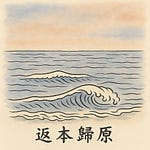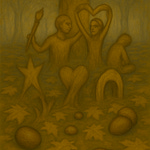Prologue:
"Rice in the Bowl, Water in the Bucket" is a Zen (in Chinese, Chán) expression that embodies the principle of accepting things exactly as they are, without adding mental elaboration or seeking hidden meaning. The phrase points to the direct, immediate reality of ordinary things performing their natural function.
The saying appears in various forms throughout Zen literature, particularly in the records of 唐, Táng and 宋, Sòng dynasty Chinese masters. It's closely related to similar expressions like "When hungry, eat; when tired, sleep." and both reveals and reflects Zen's usual emphasis on naturalness and non-conceptual awareness. The phrase gained particular prominence through the Teachings of masters in the Rinzai (臨濟宗, Línjì zōng, in Chinese) tradition, though it appears across different Zen lineages.
In Zen teaching, this expression serves multiple pedagogical purposes. It counters the tendency to seek profound spiritual meaning in every experience, instead pointing students toward the inherent completeness of ordinary moments. When a student might ask about the ultimate nature of reality or the essence of Buddha-nature, a master might respond with this phrase to redirect attention away from abstract speculation toward immediate, concrete experience.
The teaching method reflects a core Zen Principle: enlightenment isn't found by transcending the mundane world but by fully inhabiting it without the overlay of conceptual thinking. Rice nourishes because that's its function; water quenches thirst because that's its nature. There's no elusive or inapparent spiritual significance beyond this fundamental reality.
Masters have used variations of this phrase to address students who become overly intellectual in their approach to practice, or who search for mystical experiences while missing the profound ordinariness of their immediate circumstances. It's particularly effective in cutting through what Zen calls 求心, Kyūshin - Seeking Mind" - the restless mental activity that prevents recognition of what's already present.
The phrase also connects to the broader Zen aesthetic of finding the sacred within the mundane, influencing everything from tea ceremony to garden design. It represents a distinctly Zen approach to spirituality that doesn't separate the absolute from the relative, but finds them perfectly undivided and present in the simple functioning of daily life. Wherever and whenever one might look; no magic mind-state, no special time needed!
Music Cue:
Tags:
#Visualization #SomedayFarm #GuidedMeditation #Buddhism #Zen #Simplicity #SanBao
End Notes:
A related and more brief version of this is available free at:
https://www.swellcast.com/t/O1UmEhyfoQ8ltvP
Rice in the Bowl, Water in the Bucket
a Zen Guided Meditation
Settling into Presence
Find a comfortable seated position. Allow your spine to be naturally upright like a centuries-still mountain sentinel...quietly reaching toward a clear and expansive sky. Close your eyes gently, or simply soften your gaze as it falls toward the floor.
Take three slow breaths, not trying to make them special or profound - simply breathing as breathing happens.
...and sit as sitting happens.
The Bowl of Rice
Imagine before you a simple, wooden bowl filled with white rice. See it clearly: the smooth grain, the gentle mound it forms, the way each kernel rests against the others. This rice asks nothing of you. It makes no promises of enlightenment. It simply is what it is - nourishment, sustenance, the meeting of Earth and Sky, of rains and human hands.
Notice if your mind begins to search for deeper meaning in this image. When it does, gently return to this sublimely simple fact: rice in bowl. Nothing more, nothing less. Let this ordinariness fill your awareness completely.
Notice if your mind offers to muse on the rice's fragrance when freshly cooked. Or offers to imagine the curls of steam rising from this fluffy foodstuff.
The rice doesn't try to be anything other than rice. It doesn't strain toward becoming something sacred or special. In its complete acceptance of its own nature, it reveals a profound Teaching without Teaching, a wisdom without words.
The bowl receives, contains. The rice, free of want or urge.
The Bucket of Water
Now bring to mind a wooden bucket filled with clear water. See it clearly: the translucency, the refractions, the reflections. Note how the water adopts the precise shape of its container, neither fighting against the boundaries nor trying to escape them. The water simply expresses its essential nature - flowing, adapting, nourishing. It mirrors nearby movement with ripples, it reflects far-off change in its surface. It always returns to level and stillness - without reminder, without effort, without hesitation.
This rice asks nothing of you. It makes no promises of enlightenment. It simply is what it is - rains, rivers, glaciers, clouds...
Watch the stillness of this water. On its surface, perhaps you see the reflection of Sky, of clouds drifting by. Perhaps a bird, perhaps self you spy. The water doesn't grasp at these reflections, doesn't try to hold onto the beauty that appears and disappears. It simply receives what comes, mirrors what is present, and lets go without effort.
Does your mind offer to imagine cooking with the water, or watering a garden? Does your mind offer to imagine its temperature, its weight? If it does, gently return to this sublimely simple fact: water in bucket. Nothing more, nothing less. Let this ordinariness fill your awareness completely.
This water has no ambition to be ocean or stream. It rests completely in being exactly what it is, where it is. In this total acceptance, it demonstrates perfect freedom.
Ordinary Completeness
As you sit in meditation, notice the tendency of your mind to search...for something special, for some profound experience, for insight. This is expected, this is common.
When this seeking does arise, return to the Teaching of rice and water: complete fulfillment exists in being exactly what you are, where you are, in this moment. In this very moment.
Your breath moves in and out - not striving to be holy breath or enlightened breath, simply breath being breath. Your breath has no need to please your ego, your Teacher, your Ancestors. Your heartbeat continues its rhythm - not trying to be spiritual or meaningful, just the heart doing what hearts do.
Rice.
Water.
Let yourself rest in this ordinariness:
Rest.
Breathe.
Sit.
Rest.
Breathe.
Sit.
Rest.
Breathe.
Sit.
Feel how the pressure to achieve something special begins to dissolve:
The rice doesn't need to become a flower to be perfect.
The water doesn't need to become tea to be essential.
You don't need to curtail being some particular way to be complete.
You don't need to be some particular way to be complete.
You don't need to become someone else to be complete.
Rice.
Water.
Rest.
Breathe.
Sit.
Rice.
Water.
The Kitchen of Awakening
Imagine yourself in a simple kitchen, preparing a meal. See it clearly: the counter, the window, the fire. You scoop rice into the bowl - just rice in the bowl. You pour water into the bucket - just water in the bucket. Each action is complete in itself, requiring nothing more than full presence to what is happening.
Feel the weight of the rice as you pour it. Hear the sound of water filling the bucket. These sensations don't point to anything beyond themselves. They are the very substance of awakened life, dressed in the clothes of daily routine.
Your mind may invite itself to take a wander-walk and imagine more than just this rice - as it is. Than just this water - as it is. If it does, gently return to these sublimely simple Teachings, these Teachers:
Rice.
Water.
In this kitchen, enlightenment isn't something you achieve - it's something you live, breath by breath, action by action. The sacred and the ordinary reveal themselves as one seamless, simple reality.
Rest.
Breathe.
Sit.
Returning to Simple Beingness
As this meditation draws to a close, let go of any effort to hold onto insights or special states. Like the rice that doesn't cling to its container, like the water that flows freely, allow your meditation experience to be what it was - no more, no less.
Every every every moment of this livingness offers the same completeness as rice in the bowl, water in the bucket. Washing dishes, walking to work, listening to a friend - each activity contains the same profound ordinariness that holds all of life.
Rice.
Water.
Rest.
Breathe.
Sit.
Rice.
Water.
Take three natural breaths. When you're ready, gently lift your gaze or open your eyes and return to the world, carrying nothing special, needing nothing more than what you already are.
The rice remains rice. The water remains water. You remain perfectly, completely yourself.
In this simplicity, all seeking ceases.
Thank you.












Share this post